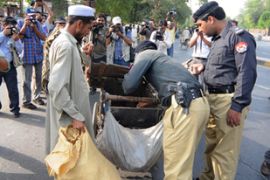Pakistan lifts Swat curfew
Military eases restrictions on seven towns as it closes in on Taliban fighters.

“I saw two people who came out to ask for relief goods and they opened the fire on them from the mountains,” Gohar Ali, a Mingora resident, said.
Sebastian Brack , a spokesman for the International Committee of the Red Cross, told Al Jazeera that refugees, as well as those who remained in the valley faced numerous problems.
“There are huge problems in terms of basic services that need to be provided – electricity, water, phone lines, the re-establishment of family links,” he said.
“The second level of the humanitarian problem is all those people who found refuge in host families, which are fairly close to the area where the fighting is taking place but which are not receiving the bulk of the humanitarian relief effort.
“That effort is being concentrated further south at the IDP [internally displaced people] camps.”
Residents starving
| In depth |
|
Pictures:
Focus: |
The military claims that Mingora, the main city in Swat, is back under government control after weeks of fighting, but aid workers say there is little food and water available, and electricity is limited.
Analysts say that the authorities must rapidly restore basic services to stop the Taliban from exploiting frustrations and poverty to remount its campaign.
The Pakistani army launched its offensive against Taliban fighters in Swat and surrounding districts a month ago after they violated the terms of a ceasefire and advanced into a region close to the capital, Islamabad.
The Swat offensive has earned US praise, but the fighting has displaced up to three million people, threatening a humanitarian crisis.
Most of Mingora’s residents, numbered at more than 375,000, fled the offensive.
Afzal Khan, one resident who stayed behind, was quoted by the Associated Press as saying: “We have been starving for many days. We have been cooking tree leaves to keep ourselves alive. Thank God it [the fighting] is over.”
Bomb blast
Elsewhere in the North West Frontier Province, at least two people were killed when a bomb ripped through a bus stop in the garrison town of Kohat.
The blast wounded 18 other people, police said.
| Watch Riz Khan |
 This Riz Khan show looks at Pakistan’s battle against the Taliban at 2030GMT. |
“At least two people were killed and 18 others wounded in a remote-controlled bomb blast at the bus station in Tirah bazaar in Kohat,” Fazal Naeem, a spokesman for the local police, was quoted by the AFP news agency as saying.
Kohat is an important garrison town on the border with Pakistan’s semi-autonomous tribal areas in the North West Frontier Province.
Ehsanullah Khan, a senior police official, said that the explosive device was hidden in a sack and confirmed it was detonated by remote control.
Pakistan has stepped up security in its cities following recent suicide bombings away from Swat, including one in the Punjabi city of Lahore that killed about 30 people.
Officials have said the bombings are retaliatory attacks by the Taliban.

 Exclusive:
Exclusive: